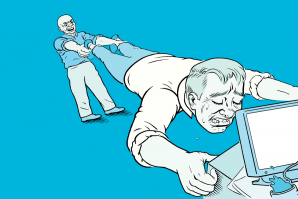
Take It Easy
U.S. workers are taking less and less vacation — here’s what their employers are losing to the vacation gap
You probably need a vacation. Most of America does. Between 1976 and 2000, the average worker took roughly 20 vacation days annually, according to data from Project: Time Off. But as the economy buckled in 2008, so did our desire to flock to the beach, and in 2015, the number plunged nearly a full week lower, translating to 658 million unused vacation days.

Dilemma of the Month: Terminated for Breaking Company Policy
I was recently let go from a job due to accessing information on our system that I had been taught was allowed. HIPAA guidelines show no issue with getting this information because it was requested. I did break a policy (that I was unaware of), and the company did not wish to discuss the matter further.

5 Ergonomic Tricks to Use at Your Desk
Ergonomics refers to the study of designing or arranging items to maximize people’s efficiency while at work. So unless you’ve put some time and thought into the ergonomics of your workspace, chances are you may be hurting yourself while on the job. Brush up on your ergo-knowledge with these five tricks to make your workplace safer and better. Your back will thank you.

Trust the Pattern
Reliability is the most important factor in establishing trust
Lately, with the news worldwide being somewhat bleak, I thought I’d write about trust -— since it seems to be waning a bit. Trust is something we commonly talk about in business, in leadership, in politics. It’s something we aspire to build and yet still seems challenging to grasp. So here’s my attempt to define trust and how it manifests in our lives.

Dilemma of the Month: Unrealistic Performance Goals
Is perfection really all that unreasonable of a request?
I was fired for not meeting 100 percent or higher of my performance goals. I feel these goals are unattainable. People are fired if they are at 99 percent. Is an employer allowed to set those types of goals?

Boundaries or Bust
Assertively draw these metaphorical lines
Boundaries are the metaphorical lines we draw to ensure we don’t slip into doing things that counter our value systems. Having clear boundaries prevents other people from taking advantage of you and helps you keep your distance from possible dubious activities. While there are no hard-and-fast rules for setting your boundaries, these tips may be helpful.

How To Leave A Job Without Burning Bridges
It’s a rare occasion when burning a professional bridge is necessary — extremely rare. In all other cases, you’ll want to wrap up your employment experience on a good note and keep those connections open for references and possible networking in the future.

Infographic: Veterans Could Use a Hand-Up
With 22 million veterans living in the U.S., efforts to provide a hand-up to vets are much needed, as they are at risk for homelessness, PTSD, suicide and other struggles.

Dilemma of the Month: New Overtime Laws
I’m a business owner in California and I’m worried about the impact of the new overtime wage rules in the federal Fair Labor Standards Act. How can I best prepare my business for the changes caused by the regulations?

Dilemma of The Month: Fragrance in the Work Place
I recently developed a sensitivity to fragrances. I get headaches, suffer from vertigo and generally feel awful. My boss allowed me to post signs that say “Fragrance-Free Zone,” but some people persist in wearing fragrances. I’m non-exempt and can’t work from home: Part of my job is to take notes in meetings, and the biggest fragrance offenders are in these meetings. What can I do?


